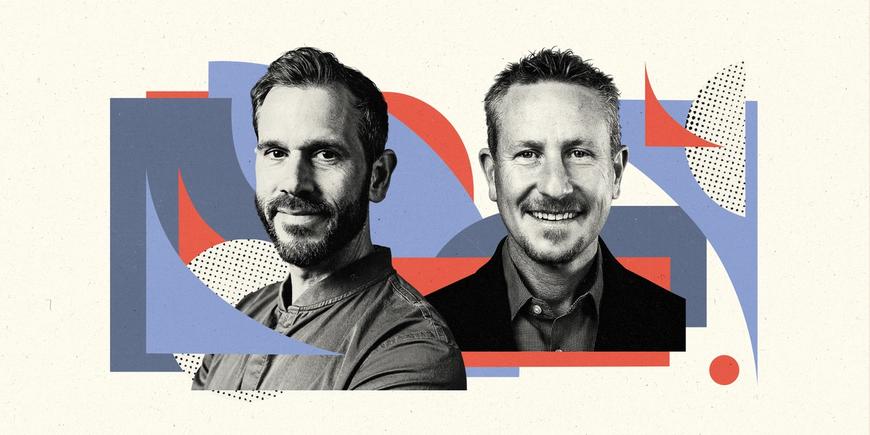Mimecast Cofounder and CEO Peter Bauer on the Importance of Building Relationships with Customers and Employees
With over 40,000 customers and 2,000 employees on deck, Peter credits a “visceral sense of empathy” for customers and reliable company culture for continued success.

Peter Bauer is the Cofounder and CEO of Mimecast, a company focusing on email and collaboration security. With over 40,000 customers, Mimecast provides proactive threat detection, brand protection, awareness training, and data retention capabilities. Peter has over 25 years of leadership experience and a track record of driving company growth and delivering results to his customers. As a strategic thinker, Peter has an admirable focus on innovation, customer-centricity, and crafting operational excellence.
I sat down with Peter to discuss his journey as a CEO, creating a cohesive company culture, and the importance of holding yourself accountable to your customers.
You've had quite the journey as a CEO. I'd love to learn more about it and hear the lessons that you've learned along the way.
I've been fortunate to have been part of building a company that's had such a robust business model, the subscription business model, that it's afforded me just enough time to be able to bumble through and figure things out.
I don't think I'd survive a day as a CEO of a company that was selling a perpetual license model because that's feast and famine all the time. That can be brutal. There's something really beautiful and elegant with all modern software companies that have that subscription business model in place. It's significantly more forgiving and I think it creates opportunities for founders who are not born as CEOs to succeed. They're driven by other things, and figure out how to be CEOs. It gives us a little bit more time, space, and grace to take those learnings and build great companies alongside our own fallible selves.
Tell us about Mimecast. What's the origin story? What were some of the early moments that led you to believe that it was onto something?
I was fortunate to get a very early start in email in the mid-nineties. I went and trained to become a Systems Engineer on Microsoft's email platform, which was a precursor to Exchange. Then, pretty shortly after that, Exchange came up, which they novelly called their first version of a client-server mail system.
Through the late nineties and early 2000s, I saw how email moved from being an obscure application to becoming quite a mission-critical system. It also became something that everybody loved to hoard their data in. There were real infrastructure challenges around backing this data up.
There were also governance challenges, e-discovery compliance challenges, and privacy protection challenges. That's without even getting into some of the risks around cybersecurity and how email, because it's this direct path to the mind and the machine of every single employee in your company, is an attacker’s go-to tool.
As this dynamic played out for almost every company in the world, an entire industry grew up around email with little point solutions to solve different aspects of this. My Cofounder and I had some experience building tech companies and selling them during the dot com boom. We had just enough money and knowledge on how to build a company and we thought what if we built something that could not only solve those risk issues, but was also a suite that reduces complexity for every company as they onboard 4, 5, 6, 7 different products.
We thought, okay, what's the opportunity here? What if we built our suite as a large-scale multi-tenanted cloud system? What inspired us about that was we could deliver this capability at industry scale. We could solve this problem on a massive scale. We were trying some pretty hard things. We were picking fights with strong incumbents in multiple categories.
In the early days as a Founder, how did you figure out what you’re about, who your customer is, and how you were going to be successful? I’d be curious to hear your take on what that journey was like going from ‘we don't know who we are and what we're trying to do’, to ‘now we know.’
When I talk to early stage Founders now, they're much smarter than we were. We had no startup book we could read, which would say, yeah, this is all quite normal. We were just making it up. My Cofounder is very much a first principles thinker. I guess common sense led us to know that we had to build and iterate.
We knew we were building something that solved problems that people had, but we had to go and affirm that and had to know how that had to be built. It was this sort of magical couple of years where two founders both built software and engaged customers.
Having our own capital and our own expertise, plus having this little ecosystem that was protected, allowing us to discover our path and find the product market fit, was important. Also, since we weren't by any means overfunded, there was a certain honesty in seeking out monetizable use cases early on and being scrappy. People can tell you that they think your stuff's cool, or it's really exciting, or it's really important, but when you ask them for a little piece of their budget and to take a risk on implementing it, you’ll find out whether they actually have that problem and whether they'd be willing to try a new way of solving it.
There's also a sense of wanting to build a company that we would enjoy working at. There's a desire to create an organization that is a personal expression of our values, our creativity, and our social aspirations. This is your community. These will be your people and they will play an important role in your life. You'll learn and discover new concepts together. It's a human experience and I think that's worth remembering in a world where we're very metrics-driven.
What are some ways that you did that at Mimecast? What were some of those qualities of culture that started to compound over time and how did you help to plant the seeds for that?
In the beginning, it’s just by being your authentic self as a leader and it is in who you hire. You're going to have to hire people that are a little different from you. You want diversity and you want different personalities. It is the circle of people and the tone that you set as a leader, how you lead by example, the values that you live, and the example that you set.
Then, you've got to put in the energy to show up, whether that's creating social occasions or being willing to use the money. We found that when the company grows to a few hundred people, you should start having HR create a specific mandate to measure these things, to give you feedback on them, to institutionalize programs, and put cadences in the daily rituals that the company does.
When you have a major setback, how does that culture show up? What does it do for you in terms of resilience, problem-solving, and getting you through the other side without droves of people quitting as a consequence of it?
I want to spend a minute talking about the habit of customer-centricity. How do you bring that value forward? Was there ever a moment where you had to learn that or was it always instinctive?
I think this is often the case with CEOs. One of our superpowers is empathy with the customer because often that's the reason the company started. The Founder experienced a problem they wanted to fix. There was something wrong about the world, the industry, or the way a particular issue was being addressed that they felt restless enough to quit their job and start a company to try and solve it.
Then, you get to a certain point where everything is a little bit bigger, you're in motion, and you start getting a little bit abstracted from your customers. People move up into management roles and you hire people who maybe take some of that for granted. They don't have that same visceral sense of empathy. How do you bring it back?
At Mimecast, we have an aspirational vision statement. When I say vision statement, I mean vision for the company as opposed to vision for the market. The vision for the company is to become the most loved and respected large-cap cybersecurity and resilience provider. To get there, you need to focus on the customers. Because if your customers don't love you, it's very hard to succeed.
It's really easy for a CEO to lose the pulse of the customer's experience. What do you do to stay on top of that?
It's tricky. In our case, we have 40,000 customers. How do you know what they're thinking? I don't know the exact ratio, but let's say one in 50 will find a way to email the CEO. We have tens of thousands of very happy customers, but I know that if I'm getting a couple of emails a month from a disgruntled customer, there are many more that aren't talking to me necessarily, but that's a signal. Then, I have to reward the signal. It's good. It's good because I wouldn't know where to improve if it didn't come to me.
You need to face the pain of the customer, listen to them, and really show an interest in creating solutions. That creates a real bond and loyalty with that customer. Listen to them and make them feel heard. Come back three weeks or a month later with feedback saying, “We've been thinking about the feedback you gave us, and we've had a couple of initiatives running to try and make this better.”
Get on the call with a customer. As a Founder and leader, you should want to hear from the customer and let them know that you feel accountable to them and to the situation, that they’re in great hands with our team, and that we’re going to fix this together.
